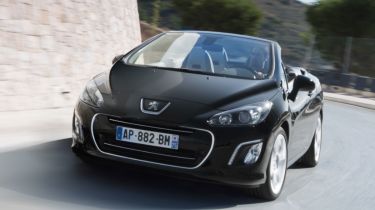Peugeot 308 CC e-HDi
Peugeot slots its efficient new e-HDi micro-hybrid technology into the freshly styled 308 CC - can it compete with VW's Bluemotion Eos?

Anyone expecting the new 308 CC to be a radical departure from the current model will be disappointed, but the revisions are generally pleasing and for the best. The CC looks better, and costs less than ever before, and although not the quickest, the e-HDi micro-hybrid engine offers impressive economy and efficiency savings. It also suits the 308's relaxed set-up, which is starting to feel a little dated compared to its rivals.
Peugeot has sold over 3.2million 307 models, so it's no surprise that the French brand has high hopes for its refreshed successor, the 308. Yet the coupé-cabriolet version tested here has always been a niche choice, so can the changes boost its appeal?
[[{"type":"media","view_mode":"content_narrow","fid":"69325","attributes":{"alt":"","class":"media-image"}}]]
The visual tweaks to the front are particularly striking on the drop-top, and the slim new grille, redesigned headlights and the now obligatory LEDs all help smarten things up.
Inside it's much the same as before, but the real news is to be found under the bonnet, with the introduction of the firm's e-HDi micro-hybrid technology. Using a 110bhp 1.6-litre diesel engine and a super efficient stop & start system, the drop-top 308 CC can achieve 60.1mpg on the combined cycle, while emitting only 123g/km of C02.
Used - available now

2018 Nissan
Qashqai
32,700 milesManualPetrol1.3L
Cash £12,800
2021 Mercedes
A-Class
41,000 milesAutomaticPetrol1.3L
Cash £17,300
2020 BMW
X2
46,200 milesAutomaticPetrol2.0L
Cash £17,200
2016 Audi
S3 Sportback
54,700 milesAutomaticPetrol2.0L
Cash £17,000The system has two super capacitors to give the main battery a helping hand when firing up the engine after a stop, and the net result is an incredibly smooth restart that's noticeably quicker and quieter than any other diesel we've tried.
Unlike some rivals, the e-HDi tech on-board can operate in temperatures as low as minus five degrees centigrade and isn't affected by extra load placed on the main battery from the air-conditioning unit or other electrical items, and consequently works much more consistently.
On the move, the new engine is relatively smooth and refined, and provides reasonable pace thanks to its healthy 285Nm peak torque figure, but is better suited to relaxed cruising than enthusiastic cornering. The useful low-down thrust is let down by the gearbox, which doesn't like to be hurried, while the over-assisted electric power steering fails to inspire much confidence in the bends.
The suspension is relatively firm too, and the larger wheels fitted to high-spec models exacerbate the problem, without providing any extra body-control. Still, the folding metal roof completes its operation in around 25 seconds, making it quick and easy to enjoy open-topped motoring at the touch of a button.
Plus, Peugeot has taken around £850 off the price tag, depending which model you go for, so the 308 CC is shaping up to be much more of a bargain than it ever before.







